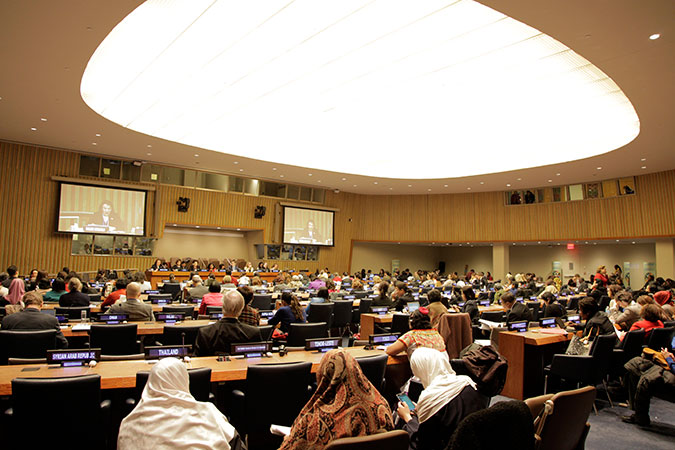Turkey reviews progress on ending violence against women
At CSW60, Turkey was among 10 Member States that, for the first time, submitted voluntary reviews of their progress towards CSW57 Agreed Conclusions on ending violence against women.Date:

On 15 March 2016, at the 60th session of the Commission on the Status of Women (CSW60), Brazil, China, Costa Rica, Egypt, Estonia, Japan, Romania, Sweden, Tunisia and Turkey presented their own self-assessments of how far they’ve come towards implementing the historic Agreed Conclusions CSW57 (2013), which focused on ending violence against women.
Gülser Ustaoğlu, General Director for Status of Women at the Ministry of Family and Social Policies, made the presentation on behalf of Turkey. Underlining the importance of international and regional conventions, she pointed to the significance of the Istanbul Convention, which is the first European convention to set legally binding standards to specifically prevent violence against women and girls, protect its victims and punish perpetrators.
“Our State has been the first to ratify the Convention, motivated by the belief that it will take us a step further in this struggle to end violence against women. It is another indicator of Turkey’s resolution in combating violence against women to start working for its transposition into national legislation without losing time,” said Ms. Ustaoğlu.
Violence against women is one of the biggest challenges with regard to achieving gender equality in Turkey. Overall, there is a decreasing trend in physical and sexual violence against women (from 42 per cent in 2008 to 38 per cent in 2014), according to the National Domestic Violence against Women Research conducted by the Ministry of Family and Social Policies. However, progress is slow and still two out of five women are exposed to physical and sexual violence at least once in their lifetime, according to the same research. Early and forced marriages, as a form of violence against women, are also major obstacles for women’s advancement in Turkey.
In her presentation, Ms. Ustaoğlu stressed the importance of National Action Plans (NAPs) to combat violence against women and girls, adding that a new NAP to cover the years 2016–2019, developed with all relevant stakeholders, will soon come into force in Turkey.
Ms. Ustaoglu spoke about the services provided to women survivors of violence as part of the legislation to prevent and combat violence against women. She mentioned “Violence Prevention and Monitoring Centres,” which provide prevention and protection services to survivors and monitor cases. “They were put into service in 14 pilot cities in December 2012. The centres are now available in 41 cities,” said Ms. Ustaoğlu, stressing that the numbers will increase nationwide by the end of 2016.
She also mentioned improvements in women’s shelters. “The number of women’s shelters affiliated with our Ministry has [increased] from 48 in 2011 to 101, while the total number [including those established by local administrations and civil society reaching] 137,” said Ms. Ustaoğlu.
Speaking about the significance of promoting awareness among public service officials engaged in provision of services to women survivors of violence, Ms. Ustaoğlu said: “71,000 police officers, 65,000 health staff, 47,600 religious officials and 326 Family Court Judges and Public Prosecutors have been trained so far.” These trainings provide information on the Law numbered 6284 on “Protection of Family and Prevention of Violence against Women” and other significant frameworks and conventions on gender equality and women’s empowerment such as the Beijing Platform for Action as well as equipping the trainees with basic gender-sensitivity awareness.
Ms. Ustaoğlu also stressed “the inhumane treatment of women in conflict… subjected to various forms of violence with sexual abuse, sexual slavery and human trafficking” and called on governments and international organizations to empower and protect women and girls in conflict zones from extremism and violence. Hosting over 2.5 million Syrian refugees, Turkey is the world’s largest host at the moment for this refugee population. Close to 80 per cent of the Syrian refugees are women and children, according to the latest data by UNHCR.
Ms. Ustaoğlu concluded her presentation with a pledge to continue to work towards the Agreed Conclusions and the end goal of eradicating violence against women: “The commitments made to strengthen women’s rights on the international agendas should not be left solely on paper and we must decisively take tangible steps to translate this into practice,” she said.